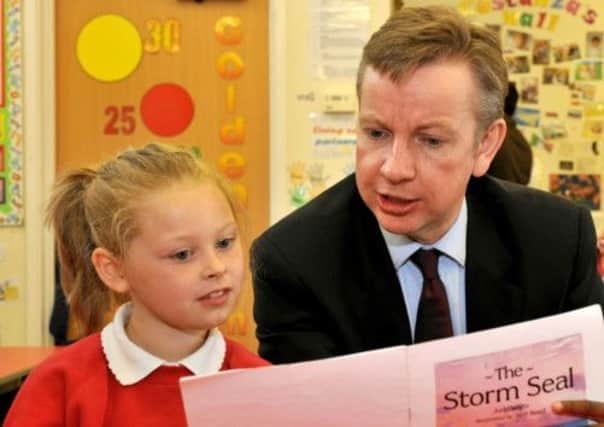Jayne Dowle: Mr Gove has turned schools into learning factories


I’m not depressed about my children. I’m not depressed about the school either, or about the teachers. I’m just utterly sad about what they are having to do to please Gradgrind Gove, otherwise known as the Secretary of State for Education.
It seems facts and calculations are the only way forward under Michael Gove. It is not until you talk to teachers that you realise the scale of the upheaval which the new national curriculum for primary-age pupils is causing.
Advertisement
Hide AdAdvertisement
Hide AdIt is the sheer, relentless demands of it, the detail, the endless benchmarks and levels that children are expected to reach that concern me. It is didactic in the extreme.
I reckon I know how to put a sentence together, but I was shocked to find that Jack’s Year Six literacy work demands an understanding of concepts and constructions I didn’t even know existed.
I’m all for clarity and plain English, but when every single word a child puts down on a piece of paper has to be considered, categorised, checked and made to fit into a certain kind of formula in order to reach a certain “level”, I begin to give up hope for creativity. And, the actual terms to describe certain processes – such as “inverted commas” are changing too – so children don’t know what they are dealing with.
I can see why 100 leading education academics recently put their names to a letter to complain that the new curriculum is nothing more than “endless lists of spellings, facts and rules”.
Advertisement
Hide AdAdvertisement
Hide AdIn English, for example, it demands that pupils know by heart around 200 complex spellings by the age of 11, and in maths little ones are introduced to fractions at the age of five, the 12 times table by nine and algebra at 11. This is indeed “too much, too young”. Where is the time to experiment? To daydream? To be, well, children?
Such critics, eminent professors or not, are shouted down and denigrated as lefty liberals. However, if we are all silenced, we are standing back to allow a generation of children to grow up mistaking rote learning for understanding, bringing them up to be so terrified of failure they will never dare to take a risk. I cannot begin to imagine what consequences this has for us a nation of entrepreneurs and creative professionals. I take small comfort from the fact that at least I have some imagination, because it is going to end up in short supply.
I’ve always felt sad that there is so little room for developing “the whole child” in modern primary school education, but have long accepted that certain rules exist and we’ve all got to pull together and stick to them in the name of progress. However, I refuse to be complicit in what is going on now, or to join the growing numbers of parents so anxious about performance in SATS tests that they are engaging private tutors for their nine-year-olds.
All this does is induce further paranoia; parents find themselves fretting desperately over the difference between a level 4a and a 4b, and children fall into a destructive cycle of comparison which causes hurtful competition between friends. I actually asked the teachers not to tell me what levels Jack and Lizzie are at because I don’t want to get sucked in. I’m more worried about their attitude to learning, ability to listen and general behaviour in class.
Advertisement
Hide AdAdvertisement
Hide AdI was so shocked by this parents’ evening that I gave serious consideration for the first time ever to the concept of home-schooling.
School is where my children make friends and learn how to socialise and get along with people. Of course, I want them also to develop the tools to express themselves effectively, to read with confidence and to be able to use maths in a practical and constructive way. And, as I teach in a university, I understand that there has to be some way of measuring and checking progress. These reforms are too much though, and not just for my own two. What they are demanding will isolate those children who find school difficult, and quite possibly, turn reluctant learners off learning for life.
I have to ask then, what is it all for? What will it prove in the end? That certain children can do certain things in a certain order? That is all. The morning after parents’ evening, when I was still on the brink of keeping them home and setting up class in the kitchen, we were almost late for school because seven-year-old Lizzie had spread out a copy of this newspaper and was attempting to read a story about the Budget.
This won’t contribute a jot to whether she’s on lime level reading or purple or sky-blue pink for that matter. It might mean that she learns to think for herself, and that will be something she certainly won’t be picking up in the Gradgrind factory of her primary school.